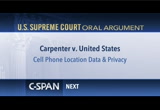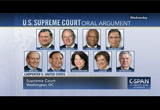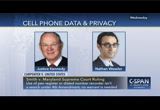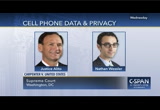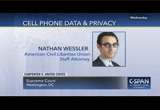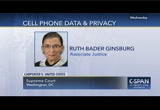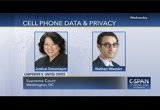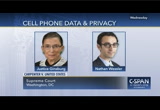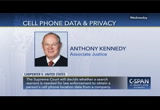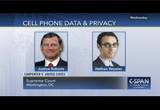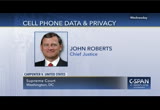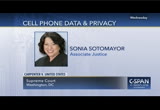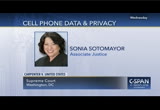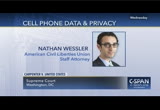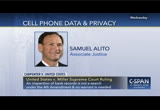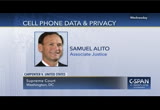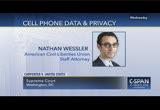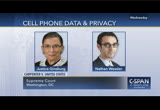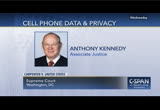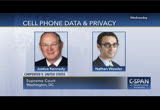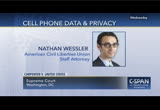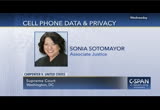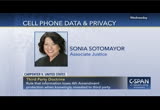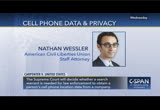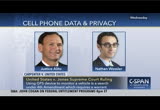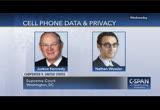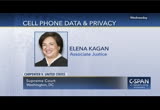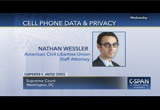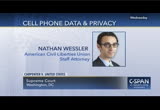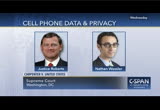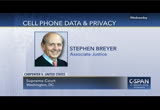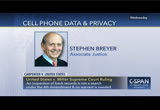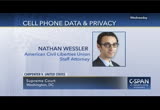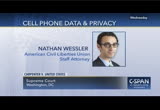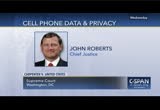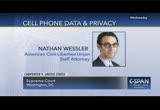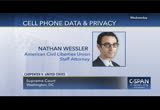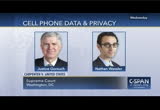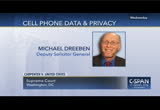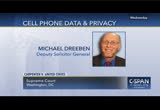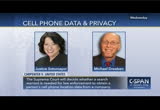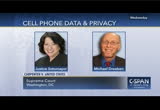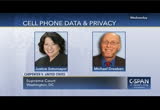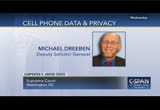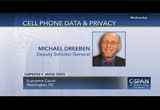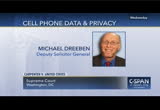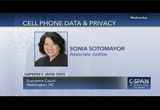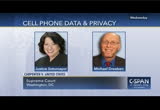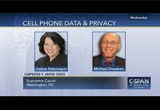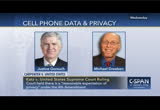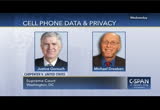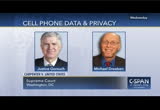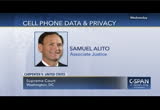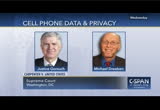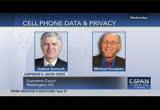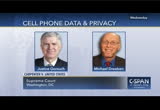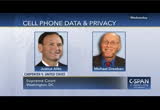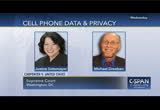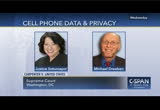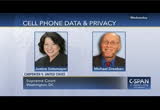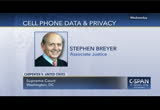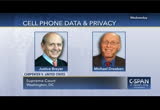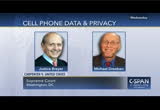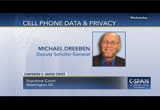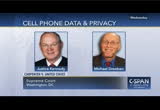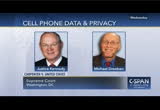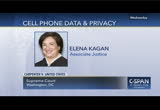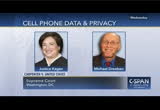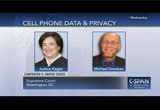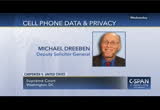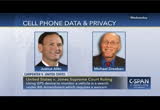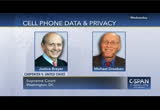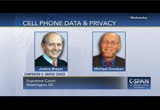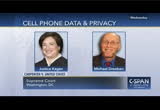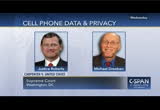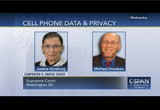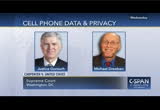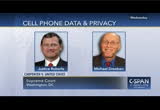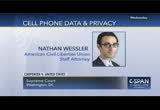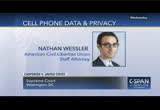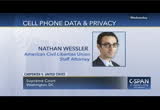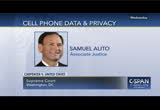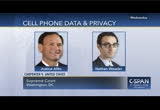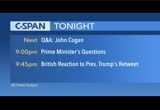tv Supreme Court Carpenter v. United States CSPAN December 3, 2017 6:37pm-8:01pm EST
6:37 pm
c-span, where history unfolds daily. in 1979, c-span was created as a public service by america's cable television companies and is brought to you today by your cable or satellite provider. >> the supreme court heard -- the government gained access to his cell phone records under an. mr. carpenter argues his fourth amendment right was violated due to the lack of a search warrant. this oral argument is just under an hour and a half.
6:38 pm
>> at issue in this case -- the collection of this information is a search as it disturbs people's long-standing practical expectations that their long-term movements in public and private spaces will remain private. >> what is the rule you want us to adopt in this case, assuming we keep a miller, miller and smith versus maryland on the book. >> the rule we seek is longer-term aggregations of cell phone location and information is a search and requires a warrant. we are not asking the court to
6:39 pm
overturn those cases. we think the lesson to be john -- to be drawn is that any extension of predigital precedents to these kinds of digital data must rest on their own. >> how would you distinguish miller? involves more limited records. they can reveal more sensitive information. as this court held, they were voluntarily conveyed in that they were created by the passing of instruments in the stream of commerce to transfer funds. what we have here is more sensitive and less voluntary. >> why is it more sensitive? why is cell site location information more sensitive than bank records, which particularly today, when a lot of people do not use cash much, a bank record will disclose purchases, it will not only disclose everything the person buys, it will not only
6:40 pm
disclose locations, it will disclose things that can be very sensitive. justiceolutely agree alito, at the information can be sensitive. what it does not do is provide a minute to minute account of the person's location at every any given period. >> why is that more sensitive than bank records which's show periodicals to which a person subscribed or hotels where a person has stayed or entertainment establishments that a person has. >> particularly because the information in the bank efforts -- in the bank records are not publicly known. your whereabouts are publicly known. people can see you, surveillance officers can follow you. it seems to me this is much less private than the cases justice alito is discussing. >> i do not agree.
6:41 pm
when a person is engaged in a financial transaction, that is an interpersonal transaction where a person has full knowledge they're putting something in the stream of commerce. as the five concurring justices made clear in jones, although we may have a reasonable expectation that someone may see where we go in the short period, no one has expected in a free society that our longer-term locations will be aggregated and tracked in the way they can be here. >> you keep emphasizing longer term.
6:42 pm
suppose what was thought here was that information for the day of the robbery. just one day, the day of each robbery. does that qualify as short-term in your view and that would not violate the fourth amendment? >> the rule we proposed would be a single contiguous 24-hour period. >> in which where you talk about, what rule? >> we do not think the court >> we do not think the court needs to draw a bright line here. as we pointed out in our reply brief -- >> justice ginsburg is not asking you about 24 hours or anything else, she is asking you about a power gap. a crime happens at a bank. the teller says or does not say that she saw the robber on the phone at some point. could the police just get a tower dump to see who was in that area at that time?
6:43 pm
>> justice sotomayor, yes, i think that would not be affected by this case. that would be short-term. >> what is the difference between a tower dump and targeting a particular individual, let's say an anonymous call came in that said john doe was the robber. could the police then say to the telephone company, let me see the records of john doe for that hour or for that day or whatever the duration of the crime was? >> yes. that would be perfectly acceptable. >> we go back to my question. you said 24 hours, roughly. if there only one robbery, we could get that information. now there are how many? eight? we cannot get it for eight, but we can get it for the one?
6:44 pm
>> we suggested 24 hours. the most questionable line -- if most administrable line the court wants to draw a line would be a 24-hour period. the court could draft other reasonable ways. >> is it was reasonable for one robbery, one day. -- if it was reasonable for one robbery, one day. why would it not be equally reasonable for another robbery? >> the risk is the risk of circumvention of this court's rule from jones. some types of crimes would be quite easy to delineate a limited set of days that information might be worth getting. others would be more difficult. in this case, it does not matter where the court draws that line. >> the longer-term is more corroborative. suppose he is in the area every
6:45 pm
day because of where he shops. it seems to me that the role you are proposing might be exculpatory information. >> we expect that if the government obtained a short period of data that appeared to be exculpatory, that would be probable cause to gather a warrant. or in the pretrial process, the defendant could obtain other records from the carrier and use those as exculpatory evidence. the concern is with the privacy invasion, which is quite severe over the long-term over these more than four months of data. >> the basis for the 24-hour exception seems to me, there is going to be protection extended to the information it has to involve some compromise of the third-party doctrine and if that is altered, i do not see why it would not also apply to one day
6:46 pm
of information. >> the only other court to address this question, the supreme court of massachusetts, drew the line at six hours. we have suggested 24 hours. >> it seems to me the line is between information to which the authorities have access and information to which they don't. i don't know why we are bothering about a line between six hours, three weeks. >> we would be perfectly happy with this court requiring a warrant as a per se matter. what we are trying to advance is the suggestion to the court that takes into account the rationality and people's reasonable expectations that although police could have gathered a limited set of locations traditionally by canvassing witnesses. never has the government had this kind of time machine that allows them to aggregate along period of people's movements.
6:47 pm
>> and another thing the government has never had is the ability to go back 24 hours and test everybody in the whole community or anybody who happened to be there. i do not know why that is a -- that isn't a consideration that cuts against preserving 24 hours two months ago. the government didn't have the capability of tracking a particular individual. they find out later that is the one they want. i do not understand the coherence of your argument on that. >> i think that a different concern would be raised by the tower jump situation justice sotomayor posited. that may involve concerns about a dragnet search sweeping in innocent people. that is not the same concern before the court here. >> isn't that the same concern here? that is why i am differentiating between incidents related to searches and basically dragnet searches when you are looking at what a person is doing over 127,
6:48 pm
30, 40, even 24 hours. it is not related to any legitimate police need to invade the privacy of a person over a 24 hour period unless there is a suggestion that the crime occurred during that entire 24-hour period. that is why i asked you, is there a difference between saying if police have cause to believe a crime has been committed, can they asked for records related to that individual crime, even if it happens on one day or the second day or the fourth day or the 10th day, so long as they are limiting their search as related to a criminal activity as opposed to a dragnet suite of everybody's intimate details?
6:49 pm
right now we are only talking about the cell site records. as i understand, a cell phone can be pinged in your bedroom. it can be pinged at your doctor's office, it can ping you at the most intimate moments of your life, presumably even in a dressing room as you are undressing. i am not beyond the belief that someday a provider could turn on my cell phone and listen to my conversations. i'm not sure where your 24-hour rule comes from. shouldn't it be based on incident related rather than -- that is the essence of your complaint, that we are permitting police to do a dragnet search of your life. >> you're absolutely correct that in the seven years that have elapsed since data was
6:50 pm
gathered in this case, network technology has advanced. today, not only is data gathered for phone calls but also text , automaticallyta checking new emails, social media messages and weather alerts. today the government is able to obtain historical information. >> i agree that this new technology is raising serious privacy concerns, but i need to know how much of existing president you want us to overrule or declare obsolete. i would like to take you back to miller and ask on what grounds that can be distinguished. you don't say we should overrule it, and you say the information here is more sensitive. we maybe could agree to disagree about that. what else?
6:51 pm
on what other grounds can miller be distinguished? identifiednd smith at least two factors to take into account in the expectation of privacy analysis. the record sensitivity and whether they are voluntarily conveyed. there is also a distinction on voluntary. unlike a negotiable instrument in commerce or a phone number punched into a touchtone phone, people when they make or receive a phone call or text message and certainly when their phone is automatically making a data connection do not provide their location information to the carrier. >> that is a debatable point, whether people realize what is going on. there is reason to think they do. there were all these commercials, can you hear me now, our company has lots of towers everywhere, what do they think that is about? a standard metro pcs contract seems to say, i guess we do not have the actual contract in the record, but they seem to advise
6:52 pm
the customer that we can disclose this information to the government if we get a court order. i do not know whether that will hold up. even if it were to hold up today, what would happen in the future if everybody began to realize this is provided, if you have enough police tv shows with -- shows were this is shown and they will know about it just like they know about csi information. >> three points. in a scholar's brief runs through the result of a survey that shows a strong majority of americans do not understand this information is acceptable to much less retained by the service providers. second, i agree that the metro pcs contract in 2010 and the other companies privacy policies today do disclose the location information. i think the disclosures in those documents worked in our favor. i will explain why this is.
6:53 pm
i should caution the court that relying too heavily on those contractual documents would threaten to make a crazy quilt of the fourth amendment because constitutional protections on happenstance. -- quite strongly promised people that their information will remain private without consent. lastly -- >> except as provided by law. >> another private person, not necessarily the government. >> modes right. -- that is right. there is a provision to disclose as required by law. those words need to be read in context and compliance with the constitution. if there is a reasonable expectation of privacy in these records than a warrant is required. even looking at the statutory framework, the government points
6:54 pm
to the stored communications act as the law requiring disclosure. when congress amended that statute in 1994, it provided two mechanisms for access to records. an order, as used here, and a warrant. a person looking at that statute will be quite reasonable to assume the reason there is a warrant is to deal with records like these in which there is a strong privacy interest. >> your argument, as i understood it from the brief and today, makes the stored communications act and the 2703-d order irrelevant. you do not even talk about it. in an area where we are searching for a compromise, why shouldn't we give significant weight to congress's determination that there should be and will be some judicial supervision over these
6:55 pm
investigations? >> justice kennedy, congress enacted the stored communications act in 1986 and amended it in 1994. three tenths of 1% of americans had cell phones in 1986, only 9% in 1994. there were 18,000 cell towers in 1994. today, over 300,000. >> you mean you act was more necessary when there were fewer cell phones? >> not at all. my point is that congress was clearly not thinking about the existence of and certainly not law-enforcement interest in historical cell phone information. there is nothing in the record to indicate any cognizance of these kinds of records. >> my question -- you give zero weight in your arguments to the fact that there is some protection. >> we acknowledge fully there is some protection, a touch more than a traditional subpoena
6:56 pm
because a judge is involved, but we think it is insufficient in the context of records held by a third-party. >> yet you said in your brief that in most of the cases, when you get one of these 2703 d orders, in my run of cases you said there was probably enough there to get a warrant. let's say this very case -- a confessed robber identifies his collaborators and there are details about the collaborator. why is not that enough to get a warrant? >> in this case it is quite possible that the government could have -- i do not know they stated probable cause on the face of the application. mr. carpenter's name is mentioned only once. they had a cooperating witness
6:57 pm
at that point, a cooperating codefendant. i cannot say whether had they wanted to they could have made a probable cause, it is possible. i want to return, justice alito, to your question. it is important to remember that miller and smith were decided four decades ago. the court could not have imagined the technological landscape today. accepting the government's limitations to radically extend those cases would put them beyond the fourth amendment. >> from the very beginning, smith, for example, basically said the disclosure at issue does not disclose the contents of the conversation. as the dissent pointed out, the provider had access to the contents of the conversation. yet we drew a line in saying cell phone numbers -- telephone
6:58 pm
numbers are disclose will because everybody knows that the telephone company is keeping track of the numbers -- you get it in the phone bill at the end of each month. we said people do not know -- or even if they realize the phone company can listen into their conversation -- that there is a reasonable expectation that the phone company will not access an urgent circumstance on death or threat. that suggests, as you started to say earlier, that it never was an absolute rule, the third-party doctrine. we limited it when in ferguson when we said police cannot get your medical records without your consent, even though you have disclosed your medical records to doctors at a hospital.
6:59 pm
they cannot touch your bag to feel what is in your bag because an individual may disclose his or her bag to the public. one of my colleagues here said, why shouldn't people expect others to touch their bag as well? the court said no because you expose what your bag looks like but you won't have an expectation people would touch your bag. is it really that far off to say, yes, i can believe that my location at one moment or other moments might be searched by police but i don't expect them to track me down for 24 hours >> we agreed the content of electronic communication. in the digital age, content as a
7:00 pm
category is underinclusive and an administrable. i think that's one lesson from joan spread -- that was one lesson from jones. that was not the content of location, it was location overtime in public. we had some very highly sensitive digital records. a person's complete web browsing history showing everything we read online, medical information , fertility tracking data, a would be vulnerable. >> suppose there was a subpoena for the numbers called from the cell phone? would there be a problem with that? that would fall squarely within the rules of smith. it would certainly be more voluntary. i think less sensitive. calledthink the numbers the people is less sensitive?
7:01 pm
how are we going to judge the sensitivity of information like this? >> the complaint opinions in already judge the sensitivity of this information. the court needs not address every other contexts. >> supposed law enforcement follows the people? that would be worst than if they followed them for 24 hours? that would be a highly unlikely and ever. >> suppose it happens, there can be very serious times when long for smit devotes a -- law enforcement devotes a tremendous amount of tax surveillance with multiple vehicles, multiple agents and it lasts for too long and it is invasion of privacy? >> that typically won't happen. we are going to talk about normal expectations. it seems to me this is a much more normal expectation that
7:02 pm
businesses have your cell phone data. i think almost everybody knows that. i don't think it is an expectation that people are following you for 127 days. that is my hypothetical. >> i agree but i am running out why using technology to me naturally possible for the rest is where might happen. here, it's more removed. never could police have decided today to track me 24 hours a day, seven days a week, five months ago. that is a new power made possible by these perfect tracking devices that 95% of americans carry in their pockets. >> if i were to talk about you about the state of understanding. the government represents those pictures in its brief suggesting
7:03 pm
that the information that is cleaned from this is very general. it doesn't pinpoint exactly where you are. in order to make effective use of it, it has to be combined with many other pieces of information. do you agree with that? what is your view of the relevance of the fact that information may not be useful in itself but it may be useful in combination with other information? does that make a difference? >> we agree where the records come from, they were generally less precise in the gps data. we don't think that makes a difference for the fourth amendment rule. jones, the data lacked
7:04 pm
rescission. it only tracked were a car went. if a person was in a parking lot, the gps data can't tell if they went to a jewelry store for a stick up, or a medical clinic for a checkup, or a cafe to meet a friend. some other amount of inference is required. the same is true here. in seven years, the data has become more precise. the proliferation of small cells, which can have a broadcast radius of 10 meters, about half the size of this courtroom, the ability of providers to estimate the actual location of the phone based on the time and angle as a signal of the foundation of the towers. and the skyrocketing amount of data usage by normal smartphone users means that even traditional towers are much closer together in urban and dense suburban areas. the distanced is less, it is -- the location information is more precise. it is also more voluminous because data connections create
7:05 pm
more information. the data points on average pale in comparison. >> one more technical question, there was a suggestion to briefs that this information is required to be kept by governmental regulation. the have any insight on that? >> there is no direct requirement that these locations be kept. what is true is the capability of the cell companies to track cell phones in real-time is a government mandated. related tolity is the capability that is relatively newer to estimate the actual location of the phone based on time, and angle of the signal. retentiono data mandate for these historical supplications. >> i would like you to take a position on this brief, is there any reason to treat grand jury subpoenas different than you
7:06 pm
would any others under legislation? >> i don't think so, this course -- this court's fourth amendment subpoenas has held onto the same fourth amendment subpoena as any other subpoena. we think it would be held to the same standard as any other subpoena or subpoena like request for these highly sensitive records. >> your argument starts with a place where i completely agree. the village snoop had a fallible memory. the 4 -- follow over 127 days. the electronic information is infallible. that is a big change. i agree, that changes there, it -- i agree that that change is there. it is there in many aspects of life, not just location. on the other side of this is
7:07 pm
that probably, i'm not sure, probably police and fbi and others, when they get word of white-collar crime, money laundering, drugs, financing terrorism, large numbers of cases, important criminal cases. they don't have followed will -- they don't have probable cause. they have reasonable ground to think and they start with bank records. all kinds of financial information, purchases. if i accept your lie that there is no such thing as location, there is, people immediately say and why? when they say why, we will have to say something like x days is very personal. it was given under circumstances where they didn't consent to it and that is basically why we
7:08 pm
throw a few other things in there to get an exception. immediately taken to the lower courts, and eventually here. people will say what about financial information, credit card purchases? the most intimate credit card purchases, wherever they are, are immediately records. you think about five others, i can only think of one or two. the legal profession and those interested understand it very well. so where are we going? is this the right line? how do we write it? not for location, i have less trouble with that. where is it going? it's a very open question but i am very interested in your reaction. >> i think in future cases and perhaps back before your honors, it would be relatively important to find categories that may be protected.
7:09 pm
certain other types of location methods, information about the state of the body, heart rate data from smart watch or fertility tracking data, information about the interior of a home from a smart phone who -- smart thermostat were the owner knows when the homeowner is home and where there. communicative contexts. not every record will or should be protected and ethnic it is -- i think it is totally consistent with the lower courts to take an interpretive principle from this court and begin to apply it. >> i want to add one thing, i i suspect you will hear it in a minute. given all the imperfections of miller, this is an open box we know not where we go. anything else you want to add? >> lower courts have been struggling to apply high seats
7:10 pm
-- highly sensitive records. the five courts of address this have generated 20 majority opinions, many of them baking this court to provide guidance with how to prevent -- protect the sensitive digital records that the court could not have imagined. >> a lot of what you are talking about is addressed under the question of whether a warrant is issued. as opposed to whether a warrant is required. under current practice, it makes a difference if you go in and say you want to search the entire house for anything i can find and if you say i want to search for business records that we think are related to everything. is the same thing here. technology affects every aspect of life, that doesn't mean they -- that the warrant has to. if you can focus on wanted to talk about whatever it is, purchases because we have reason to believe he is purchasing
7:11 pm
things that goes into making methamphetamine but that doesn't mean we will look at location information. >> the probable claws and requirements of a warrant will do a lot of work to focus investigations. in an investigation like this, or 152 wouldays, not be under a warrant. a two or three day span on each of the robberies would be probable cause but our basic submission is that a warrant is required in this context because it is on like the other subpoena cases the government has identified. in the normal subpoena case, this court has identified two factors that way on the category of subpoenas. the first that the recipient complies with it. they provide them to the records, poses less of a risk of
7:12 pm
abuse. is known as an opportunity for a complaint review. neither of those obtained here where the subpoena goes to a third-party but the subject of the investigation receives no notice and has no opportunity. >> can you tell me what is the difference between the 2703 g order and a warrant? what are situations where you could get the order but not a warrant? issuance ofard for the order is lower. some courts have likened it to a reasonable suspicion standard. i think it's a touch above pure reasonableness, but it is certainly short of probable cause. it lacks the requirement for a sworn statement. it is placed before a magistrate judge by a prosecutor and it lacks a particularity requirement. it has led to extraordinarily broad requests.
7:13 pm
if i brief one case, or the government obtained 154 days of historical location data for one defendant, 388 for another. 221 days in the courts are with this one pending, that is quite extraordinary and if i could i would like to reserve the bounce of my time. >> we are focusing on the property faced approach. what do we know about what state law would say about this information? into t-mobilee and sought to make economic value of its information, would your client have a conversion claim? >> i think conversion is what we have here. we placed the source of the property right here. >> i got the argument, i am wondering if you have state courts develop this all? >> state courts have not to my knowledge. i think conversion applies but not directly.
7:14 pm
>> thank you council. >> mr. chief justice, if you -- may it please the court. the technology is new but the legal principles this court has articulated under the fourth amendment are not. the cell phone companies in this case function essentially as witnesses, being asked to produce business records of their own transactions with customers. the cell systems cannot function without information about where the phones are located and anyone who subscribes to a cell phone service will communicate that information in order to receive calls, the cell phone companies get that information to operate the cell network, they choose to make their own business records with that information. it is not a government mandate. they make decisions based on their own business needs and what they will retain. when the government comes and asks them to produce it, it is doing the same thing it did in smith.
7:15 pm
it is doing the same thing it did in miller, it is asking a business to provide information about the businesses on transactions and under the third-party doctrine, that does not advocate the fourth -- implicate the fourth amendment rights. >> this is not simply created by the company. it is a joint venture with the individual carrying the phone, that helps the company create a record by being there and sending out pings. >> that is true but it is no less true in smith and miller. in order for the phone coming to -- in order for the phone company to have a record of who a person called, the person has to make the call. the information goes to the phone company, the phone company uses that information to route the call. the cell phone provider gets information from the phone about where the phone is so that it in route calls to the phone so it can route calls from the phone. that is the basic technological nature of cell phones.
7:16 pm
it doesn't differ in principle from what was going on in smith. you can say the same thing about miller. somebody has to engage in banking transactions to a bank. they write a check, they give the check to the bank, they use it to carry out the banks business. >> they don't give it to a bank, they give to a person who gives it to the bank. >> i think there are many different ways to carry out financial transactions, including some that involve giving a check to a person. many involve going to the bank directly and having the bank conduct the financial transaction. anybody who writes a check understands it will be submitted to the bank. ok in the wayot we set about papers to plant a beeper in somebody's bedroom, but it is ok to get the cell phone records of someone who -- i don't but i know that most
7:17 pm
young people have the phones in the bed with them. i know people who take phones into public restrooms, they take them with them everywhere. it's an appendage for some people. if it is not ok to put a beeper some one possibility, why is that to use the signals phone is using from that person's bedroom? made accessible to law enforcement without probable cause? >> i will answer the question about cell phone location but i think it is important that the court understand that this case involves very generalized cell sector information. >> we need to look at this with respect to how the technology is developing.
7:18 pm
>> there is a distinction between acquiring gps information and cell site information from a business. this involves acquiring cell site information from a business, a wide area are briefed to illustrate -- >> this is no different than a telephone company having access to your telephone conversations, but we protected those. >> it is very different from it, the expectations of privacy about the contents of a one-to-one communication or one too many communication are quite different. they grow out of the bed rock understanding that a letter mailed through the mailed, the routing information is available to the government, the address of where it is going. >> in an envelope, you can control the public disclosure. with telephones, the telephone company could plug in and listen
7:19 pm
to your conversation just as easily as these telecommunications companies can read your emails if they choose. yet you said we would protect email content. >> that is true. there is a difference between content and routing information that the court recognized. we are dealing with routing information, not the contents of communication. thatee that it makes clear incidental access of a provider to the content of a communication when the provider is functioning as an intermediary does it initiate fourth amendment protection. we are not here to argue that it does. we are here to argue that routing information of the sort that was available in smith and here functions as a business record because the business is using it in its transactions with the customer to route the calls. the content information is being provided through a provider as
7:20 pm
an intermediary so that somebody can communicate with another person. >> how is this different from jones? in jones, there were a couple of different opinions. five justices said this. society's expectation has been that law-enforcement and others would not monitor and catalog every single movement of an period.al for a long how is it different from that? acquiring thees business records of a provider which is determined to keep these records of the cell site information. jones involves government surveillance. it involved attaching a gps device to a car. five other members of the court were prepared to analyze that under reasonable expectations of privacy. in both cases, it was direct surveillance of the suspect in the crime.
7:21 pm
question is why that should make more of a difference then obvious similarities between this case and jones. the obvious similarity is that in both cases, you have reliance on a new technology that allows for 20 47 tracking. you are right, there were different means, in both cases you have new technology that allows 20 47 tracking and a conclusion by a number of justices in jones that that was an altogether new and different thing. it did in truth on people's expectations of who would be watching them when. >> the people who are watching in this case are the phone companies because people have decided to sign up for cellular service in which it is a yoursity of a service that phone communicate with a tower and a business record is generated. people who dial phone numbers on calls know they are being routed through a cell phone or landline
7:22 pm
provider. those records could be made available to the government, for extensive periods of time. in many ways, it is far more revealing who the person is calling then to the generalized cell sector where phone is located. the cell site information doesn't tell you the person with the phone -- >> what do you do with the survey mentioned by your opposing colleague that says most americans want to avoid big brother? they want to avoid the concept that governments will be able to see and locate you anywhere you are. time. point in believe that people expect that the government will be able to do that without probable cause and a warrant? the constitution protects the
7:23 pm
rights of the people to be secure. isn't it a fundamental concept that that would include the government searching for information about your location every second of the day? this,instances like involving rapidly changing technology and privacy expectations being measured here by surveys. the proper body to address that is congress. congress has been active in this area. >> the question is, the fact that congress recognized how sensitive this information is is quite laudatory. did it understand the measure of the constitutional requirement of what protection should be given to that? isan defer to congress ,nderstanding of the privacy
7:24 pm
but does that create an obligation for me to defer to the judgment of what protections the constitution requires? has said theion government can't intrude, except in some carefully defined situations, special needs being foremost among them. can't intrude on those privacy interests without a warrant. we not -- we're not saying they can't ever, they just need to have articulable facts based on reliable information sworn to an affidavit that can provide probable cause to believe this is new angel -- this individual is involved in criminal activity. that is not a new standard, it is an old standard. >> the new standard here would be saying of the business records of a third-party when acquired by the government constitute --
7:25 pm
>> we have said -- we have made exceptions all the time, even in creating smith and miller. we created an exception, people disclose the content, the telephone calls to third parties. we said the government can't intrude without a >> warrant in that situation. >>i think there was a well-developed framework when smith and miller had a warrant applied to smith and miller. it said in our society, if you communicate information to a third person, the public has an interest in that person pause witnessing of what they heard or what they said and can acquire it through means short of a warrant. that was the basic framework that led the court to conclude that what you maintained privately in your house or in the content of your phone calls requires special process. >> i would like to drill down on that and return to justice
7:26 pm
kagan's question, the facts and -- wind of looking like jones, one thing jones taught us and reminded us is that the property-based approach also has to be considered, not just reasonable expectation approach. if we put aside the reasonable expectation approach for a moment, miller, smith, and ask what is the property price? let's say there is a property right, say i have a property so ifin a conversion case someone were to steal my location information from t-mobile, i would have a conversion claim. for the economic value that was stolen. wouldn't that be a search of my fact under the property-based approach approved in jones? suppose that if you are insisting that by acknowledging it is a property right, some
7:27 pm
consequences will follow with that. >> this is my hypothetical , counsel. i know you don't like it, i got that. >> lets say i have positive law that indicates it is property rights. would you agree that is a surge of my paper effect? >> >> no i would not. >> why not? >> it is not your paper -- property law says it is. >> its hypothetical, counsel. i didn't like hypotheticals, too. if you stick with my hypothetical -- >> i think the problem is that it creates a property in transfers -- >> can you stick with my hypothetical then you can tell me why it's wrong? >> under my hypothetical -- sure. >> >> under my hypothetical, you have a property right in this information. would it be a search of my paper
7:28 pm
and effect? yes or no? >> i am not sure and the reason i am not sure is because there has never been a property right recognized in information that is conveyed to a business of this character. if we were talking about email , as your opinion in ackerman think to the property, i we would have a more complex discussion about it. i'm not sure it would achieve different results. >> you are not here to deny that there would be a property interest. >> i am here to deny there is a property interest in cell site information. >> if there were a property interest, you are not going to deny it. >> i am not here to concede it, either. is reason i can't concede it it is a property right that resembles no property right that has existed. >> along those lines, i was try think of aning to example of a situation in which a person would have a property
7:29 pm
right in information that the person doesn't ask the third-party to create. the person can't force the third-party to create it or to gather it. the person can't prevent the company from gathering it. the person can't force the company to destroy it. they can't prevent the companies from destroying it. according to petitioner that customer hasn't even the right to get the information. >> we know those are a lot of good reasons on why this should not be recognized as a property interest. i can't think of anything that could be characterized as a property interest with those traits and it would be a
7:31 pm
>> the fourth amendment applies once the court has identified the stretcher creates. in the fourth minute, it will determine what can be field. why does the statute control the constitution? i think the interest in the statue creates has to be looked at as a whole. this court has been very careful. >> i know the court has rejected that. whatwe are looking at interest congress has sought.
7:32 pm
the team's germane to a congress is trying to do. congress was china say companies are collecting information. in this.ize you're we want to give recognition to this. i would read the phrase, customer proprietary information. it is proprietary to the cell phone company. therefore, not to the customer. there is information about the cell phone company. i assume that kind of information would be available to the fcc. so with the fcc and obtain it, they would have to treat it as proprietary information of the
7:33 pm
company. am i wrong in that? the waynot sure that's congress intended it, but i think what is significant is not the label, but what underlying rights were created. that is precisely my point. as a label to indicate that respect for privacy interest when people interact with telecommunications companies, it provided certain non-rules. it also made clear that -- >> what does the government say to telecommunication providers? you cannot use this kind of information. >> i'm sure that in regulating the telephone companies -- >> was the difference between that and say, if you want to create this information, you are
7:34 pm
taking this information from customers and it is the .ustomers information you cannot disclose it without the customer saying yay name. isn't that what congress did -- yet or nay? isn't that what congress did? baking the question, which is, what does the law, the fourth amendment require in those circumstances. setare saying congress can the level of what the constitution requires, that that is true. i think it is definitely not true. this court as the arbiter of the fourth amendment but it has decided that question. it has decided to things. under the third-party doctrine, business information, that is a pain from the company, it is not
7:35 pm
-- >> is it the third party's information when congress says its customer information? >> congress can say a lot of things. i think the important thing this is about what the third-party doctrine is. the court is made clear that state laws that provide additional enhance privacy protection do not alter fourth amendment baselines. it said that in greenwood. where it confronted a claim that the stored communications act, the same lot issued here created some sort of an expectation of privacy above and beyond what the fourth amendment required. the court said, we do not measure fourth amendment rules about privacy expectations and text messaging by what congress has provided in the context of the communications act. i think it illustrates that congress efforts to provide
7:36 pm
enhanced protection above and beyond what the fourth amendment does, do not fall through the context of the fourth amendment. >> at this point, your reaction to what i asked the other side -- i agree with you that the law is at the moment, third-party information is third-party. with a few exceptions. it may be that another exception should exist for the reason that the technology since the time those cases has changed dramatically to the point where you get cell phone information and tower information and put it together. in a way that tracks a person's movement for 274 days. that is an unreasonable thing for the government to do. one thing that is bothering me about that line is what i said
7:37 pm
before. i would like your reaction about how to draw such a line, if we draw it. i would be very specific about this, i said -- i didn't have much basis in your brief for saying it, it is true that it is quite frequent or at least not abnormal for the government when faced with reason to believe that there is security violations, white-collar crime violations, terrorism and financing violations that they do go to banks. for purchase information, without a warrant. you don't want that interfered with. it may not worry you so much that they can't track a person physical. the technology has changed dramatically there. maybe it is an unfair question to ask you.
7:38 pm
how would you draw that line? >> i am not going to draw that line. i don't think that it can be drawn coherently. >> just say what he said on the other side. what we say is, look, what we have here is many, many days of the government taking previously unavailable tower information. miller.ime of the now putting it together in order to track where this human being has been for a long amount of time, something that never could have been done before and to do that without some probable cause is an unreasonable thing. what is wrong with that? it does not have a coherent principle that will explain why -- some rules will not be applied to credit card records or debit card records or records one used to travel through uber,
7:39 pm
or other digital records that are created. >> maybe it does have a principle. maybe the principle is, look at the exception they had made for diagnostic hospital records, that is an exception and it has to do with physical bodies and it has to do with the private information related to those physical bodies, and here, if in fact there are similar things in similar circumstances of highly private information -- you draw there and yous have it over here, if you had the similar thing, all those factors meant in those cases, so be it. >> there is a significant difference between the kinds of cases we are talking about involving direct government is hedging activity and governmental acquisition of businesses, the government is not monitoring the movement of this person by attaching a device to that person or by surveilling them, and issue i think that itself raises difficult questions.
7:40 pm
since it does not appear the petitioner objects to telling somebody in multiple cars over 127 days. what we are talking about here is that the station between the -- is the distinction between the government and going and getting information from an individual and the government going to a business and asking the business to serve as a witness. i think your honor's point about how investigations proceed is exactly right. what the government does at the early stages of an investigation is reach out to third parties because it may not have enough information about whether a crime has been committed or whether a particular individual is culpable for that crime, it goes to third-party providers who have information that allows them to narrow the field and find out what is going on. >> if there is a shooting into a house and someone is killed, and witnesses say the shooter was running away with a cell phone, the companyce asked to release all information of
7:41 pm
cell phones in that area, you do not have to go to the -- to get a 2703 d order. >> we do have to get it. >> even for a blanket search? close described earlier was getting tower information. we use that technique when a bullet was fired through a window at a federal judge in florida. the government did not have a clear idea of who the suspects would be. it attempted to narrow down the field. and we got in order in order. i think this is another answer to your concern, not only are we going to less sensitive sources of information at the early stages of an investigation, together information about what the criminal activity is and who might be involved in it. we are also operating under a statutory regime that requires particularized
7:42 pm
showing. >> that is ago a question. the question here is the constitutional question, not the statutory one so it seems to me this is the essential identity between the factual circumstances here in jones which is the government getting 24/7 information. in some ways you could say this is more about every place that you are, whether you are in a car or not. you said to me that what makes it different is that you have given the information to another person. i recall that when you are here in the jones case, your reason for why that was permissible was that you had given that information to the entire public. in other words, just by being in the world, everybody sees you, everybody watches you and you have lost your expectation of privacy in that way. we conclusively rejected that argument.
7:43 pm
why is it different giving in to one person, the same information, the 24/7 tracking, then we said it was when you give it to the entire world? >> it is fundamentally different in the mean that we chose to employ in jones versus this case. it is also different in what information we are acquiring. trackingt acquire 24/7 of the precise movements of an individual everywhere he went. we acquired the information of the cell tower. >> let's assume mr. wessler is right and that the technology gets even better. not and more precise, it is 10 football fields anymore, it is half of this courtroom. they may be in eighth of this courtroom. let's assume that we are looking ahead just a little bit and it's pretty precision targeting. would say that the third-party doctrine does not change. i also think that this court
7:44 pm
could disagree and draw a line on more precise information that involves 24/7 tracking. this information is far more similar to what was going on in the smith case where we got dial phone numbers that would reveal a much more precise location where the dial phone number came from and the person being spoken to, this case does not present the court with the opportunity to decide the kind of granularity that they may have in the future. if it does -- >> would it be permissible for the government to ask a cell phone company for lifetime information? under your view of the constitution? >> i think it would be highly questionable under the constitution. providers, which are hardly shy about preserving fourth amendment rights and have protections against unduly broad subpoenas that this court has ,ecognized in a line of cases
7:45 pm
summarized in our brief. >> where other lines? >> there has to be showing of relevance, a showing of congressional authorization, it cannot be unduly broad to be unduly burdensome. >> those protections are available in the magistrate's decision of whether or not to issue the warrant. if we assume the statute went away, for reasons that i would like to come back to, i think the court to decide the case based on the statute's compliance with the constitution even if you assume there is a privacy interest at stake. if there is no statute and we are going after a subpoena, there is a long-standing recognition in this court cases that unduly broad subpoenas are subject to being squashed, this is under fourth amendment principles and the principles that are considered in that context are raised by the provider that can include the
7:46 pm
sensitivity of the information -- this court expressly said, we understand there is a lot of sensitive banking information going on. there are other protections beside abolishing the third-party doctrine. they include the first amendment, they include objections to the overbreadth of request, in response to your question -- for the government just walk in and get a lifetime of information? no, i don't think we could or would. we are limited by fourth amendment principles that apply to subpoenas where there is not additional statutory protection. >> in order to understand the issue here and to see the difference between this case and jones, isn't it necessary to go back to old supreme court cases that explain how the fourth amendment applies to a subpoena asking a party for ordering a party to produce documents is not a search in the literal
7:47 pm
sense of the world. it is a seizure. cases going back to old cases saying it is a construct of surge. in a situation of a construct of search, the fourth amendment standards that apply to an actual search are different. it is a fundamentally different framework. completely different framework because of a lesser degree of intrusion because the government is not going and --ducting search at 70 search activity and because there is an opportunity for judicial review. >> we have the answer, we say how do we distinguish this case from all the cases that you want to get commercial information with respect to the commercial information, banking and all the things for white-collar crimes, it is commercial information and you have the subpoenas.
7:48 pm
and you perhaps have the protections that you are talking about here. this is highly personal information. it is somewhat closer to the testing for commercial information. i can imagine writing a paragraph like that and say this is the future. does that work? i know you would say no, but i need to know the reason. >> the basic principle here in the fourth amendment as how the government acquires information matters, not the sensitivity of the information, i have to disagree that medical information is given heightened protection under the fourth amendment. >> the diagnostic test of the hospitals. know, the ferguson case involved a compelled test. a urine test that the court assumed was given without informed consent so that governments urged by government hospital personnel the required
7:49 pm
law enforcement purposes, that is the government search -- i think it's also answer the question about acquiring gps information under e 911 for handset, the government reaches into the phone, pulls out information, that i would concede is a search, what we are doing here is not going to the individual and extracting information from him, we are getting information from a third party provider, relying on the line of cases that the justice referred to that allow us -- >> that line of cases was developed in a. in which third parties did not have this kind of information. >> the decision in smith. justice stewart one that you are getting incredibly intimate information when you get the phone numbers from people you have called. if the court things about it, the information you get if you know who you are calling and the inferences you can draw about what kind of conversations
7:50 pm
people are having are extremely sensitive. >> but if i understand what you are saying, you're basically saying, the course the government is going to a third party hearing, doing get by subpoena, it does not matter how sensitive the information is, it does not matter whether there is really a lack of voluntary -- voluntariness in terms of conveying that information to the third-party and we could go on and we could give other factors that we would think , in a sensible world, would matter to this question and you are saying that all of that is trumped by the fact that the government is doing this by subpoena rather than setting up its own cell towers. >> i don't think i did say that. there is an element of voluntariness and decided to contract with a cell company just like there is an element of voluntariness in getting a landline phone and making calls and there is an element of voluntariness in signing up for a bank account and using a debit card to purchase everything in
7:51 pm
your life. >> this as inconsistent with our decision in riley which emphasized the you don't have a choice these days if you want to have a cell phone. >> not in a practical sense, that is why we did point out that cell phone for necessities, the dissents in smith and miller pointed out a private telephone has become a necessity, a bank account is a necessity of carrying a financial transactions. >> the distinction you made between the means of the government using that we must be concerned about and that the -- and not the information it obtains. in riley, it was the most traditional means, -- it was a search. >> it was a search. i think that is the key point, this is one of riley actually observing whether acquiring aggregated information through
7:52 pm
other means would be subject to a different for the amendment analysis. >> it seems like your whole argument boils down that if we get up to the third-party we are ok because of happy interests, regardless of everything else, how does that fit with the original understanding of the constitution and assistance? john adams said one of the reasons for the war was used by the government of third parties to paint information or force them to help as their sketches snups.ches and why is this government not what the framers were concerned about. >> this was allowed for people acting under governmental power to search for anything they wanted. >> as long as a third parties involved, we can get everything we want? >> if there is a search and the acquisition of sulfide information, it is the cell
7:53 pm
company that is acquiring the information without governmental investigation. >> i think a subpoena is the equivalent of the rate of assistance. >> i don't think a subpoena is an equivalent. it allows the agent to going to go into any house, rib over anything. >> you can subpoena anything that the company has in the globe regardless of any property rights, any privacy interests, simple because it is a third-party? >> there is a traditional understanding that dates back to the time of the founding that subpoenas stand on a different footing from search warrant and they do that because they are less intrusive, they do require -- they do not require the government going into private property and searching itself. >> the subpoena tells the person who gets it this is what you have to do, the whole question is whether the information is accessible to the government. >> i think most basically, it makes a difference because the court cases have said so in time
7:54 pm
immemorial, the reason why it is -- it has said so is because if i go into your house to search, i will expose additional information to government view besides what is an authorization. the difference here is that the government is operating under court supervision with an order that provides particularly, it provides the interposition of a magistrate between the government and the magistrate of information and requires a showing that is less than probable cause, but is above what a traditional subpoena requires. even if the court does think there is a search here, congress has calibrated the balancing of interests and the court should affirm it as a constitutionally reasonable order. >> four minutes mr. wessler. mr. wessler: to begin on the subpoena point, justice alito, i
7:55 pm
think this court made absolutely clear that the historical pedigree of the doctrines does not automatically determine the outcome and digital age. and as you recognized, the search instance to arrest document has said that before the framing of the fourth amendment, yet it yielded to a new understanding. but this would, be revolutionary to fundamentally change the understanding of the application of the fourth amendment to subpoenas. do you want us to do that? wessler: i don't think it is revolutionary, i think the reason that it is is the content of electronic medication should be -- we already dollars of the subpoena doctrine can't stand in its most superior form and if
7:56 pm
the content of him as are to be protected, it is not because they are sealed in transit, their unlike the paper letters, that were issued in 1877, they actually accessible to -- and access by the service writers. including the microsoft case you heard later this term, if they are protected, it is because of their sensitivity. as they recognized in jones, they also are highly private and sensitive are these kind of longer-term location records. i just want to highlight that the government conceded that the precision of these records does not matter at all to the government, they can be precise, i can take it to within a single inch on the fact that a third-party has custody of them which we think would be a very destructive role.
7:57 pm
-- rule. third, this is not an area where the court should pause and wait for congress to act, my colleague intimated that in an area of rapidly changing technology, it is appropriate to perhaps of and let congress step in. we are well over two decades into the cell phone age. this is an area where the court recognized that people's use of the technology is well settled and only becoming more pervasive overtime. we know the case before the court now is crucial and -- crucial that the court act. finally, to the property principles, one statutory point, section 222 c two does give the customer the right to obtain information, as reported, our carriers have not complied with that. at least as of several years ago. >> you said in your brief that companies would not comply.
7:58 pm
ssler: i don't know what the state of play is today, i know a few years ago, the last time i had information, they were not complying. under for the moment principles, it is quite common for property rights to be divided between different parties for the bundle of sticks to be split up. here people have a right to exclude to determine the right of use of the data. secured by the telecommunications act. certainly we acknowledge that the provider itself has some property rights, maybe of those several states in a bundle, that does not eliminate some right on the part of the customer. if the court has no further questions, we ask that you reverse this. >> will this do any good for mr. carpenter? under emily versus crow, this search is conducted in reliance
7:59 pm
on a statute authorizing the search in accordance with certain procedures, disclosure -- exclusionary rule does not apply. mr. wessler: that question is not before this. i think that we have argument on both of the types of arguments on both of the good-faith exception and the statutory prong, the stork imitations act provides to mechanisms, and order and a warrant and we think that makes this fundamentally different in other statues that may clearly provide a means and second, on the court order, this is unlike a warrant and all these court cases have dealt with warren's based on affidavits and untwist application from a prosecutor with it should know better, thank you. >> the case is submitted. >> tonight on c-span, q and a with senior feller -- fellow
8:00 pm
john followed by the british house of commons. embers of the british parliament react to president trump's retweet of anti-muslim videos. ♪ >> this week on q&a, hoover institution senior fellow john cogan. he discusses his book, "the high cost of good intentions." the history of the federal entitlement programs. oft: author of the -- author "the high cost of good intentions." when did you get interested in entitlements? guest:
63 Views
IN COLLECTIONS
CSPAN Television Archive
Television Archive  Television Archive News Search Service
Television Archive News Search Service 
Uploaded by TV Archive on

 Live Music Archive
Live Music Archive Librivox Free Audio
Librivox Free Audio Metropolitan Museum
Metropolitan Museum Cleveland Museum of Art
Cleveland Museum of Art Internet Arcade
Internet Arcade Console Living Room
Console Living Room Books to Borrow
Books to Borrow Open Library
Open Library TV News
TV News Understanding 9/11
Understanding 9/11